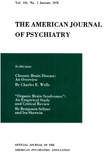Depression Occurring During the Course of Recovery from Schizophrenic Symptoms
Abstract
Schizophrenic patients followed longitudinally from an acute psychotic phase to a remission were rated as more depressed during the period following improvement of schizophrenic symptoms than during the hospital course as a whole. The period following remission of symptoms may be a period of relatively high risk of suicide in schizophrenic patients.
One patient treated with phenothiazines after a period of severe psychosis showed no elevation of 17-hydroxycorticosteroids during the depressed periods as compared with a preceding nonpsychotic and nondepressed period. 17-hydroxycorticosteroids were elevated during the psychotic phase both as compared with normal values and as compared with the remainder of the hospital stay.
Access content
To read the fulltext, please use one of the options below to sign in or purchase access.- Personal login
- Institutional Login
- Sign in via OpenAthens
- Register for access
-
Please login/register if you wish to pair your device and check access availability.
Not a subscriber?
PsychiatryOnline subscription options offer access to the DSM-5 library, books, journals, CME, and patient resources. This all-in-one virtual library provides psychiatrists and mental health professionals with key resources for diagnosis, treatment, research, and professional development.
Need more help? PsychiatryOnline Customer Service may be reached by emailing [email protected] or by calling 800-368-5777 (in the U.S.) or 703-907-7322 (outside the U.S.).



